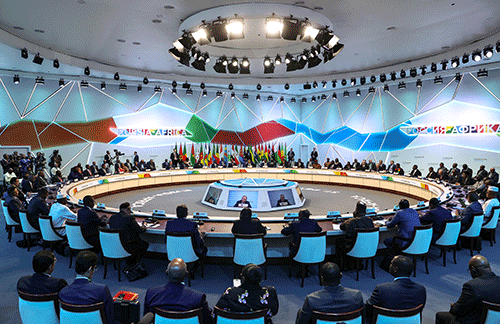STPETERSBURG – The Russian government has agreed to work with Africa to counter what it termed manifestations of neo-colonial policies propagated by Western interests.
According to Russian officials, neo-colonialism aims to undermine sovereignty, curtail national decision-making and plunder Africa’s natural resources.
Neo-colonialism can be referred to as the use of economic, political, and cultural or any other form of duress to control or influence other countries, especially former colonies.
According to a summit declaration, countries agreed to oppose aggressive nationalism, neo-Nazism, neo-fascism, Afrophobia, Russophobia, all forms of racism and racial discrimination as well as discrimination based on religion, belief or origin, xenophobia and related intolerance against, in particular, but not limited to migrants, refugees, and asylum-seekers.
“Expressing deep concern over the challenges related to global food security, including the rise in food and fertiliser prices, as well as the disruption of international supply chains, which disproportionately impact the African continent,” reads the summit declaration.
This agreement stems from the just-ended Russia–Africa Summit where African heads of state met with high-ranking Russian officials, African Union representatives and leading integration organisations from the continent.
The gathering took place from 27 to 28 July 2023 in St Petersburg, Russia. At the event, summit decisions were shared with all participants while individual countries entered into separate agreements aimed at enhancing trade and ties with Russia.
Meanwhile, at the summit, Russia and participants reaffirmed the need to jointly oppose neo-colonialism which they argued is imposing unrealistic conditions and double standards on African nations. Summit organisers emphasised that African states must be able to determine their own developmental direction.
In addition, Russia as the summit host, implored African nations to make joint efforts in pursuit of long-term food and energy security on the continent. During the summit, Russia also advocated for strengthened cooperation in countering unlawful and unilateral restrictive measures that place African countries at risk of both food and energy shortages.
Moreover, Russian officials at the summit welcomed the operationalisation of the African Continental Free Trade Area (AfCFTA) to enhance continental market integration, industrialisation and economic development by facilitating technology transfers and encouraging investment.
In this regard, Russia pushed for the facilitation of further cooperation between the Russian Federation and Africa in attracting investment, promoting the development of value chains and boosting mutual capacity to produce and export value added manufactured products.
“Facilitate equitable access of all states to the benefits of the world economy and the international division of labour, as well as to modern technologies to support equitable and even development. Stress the need for inclusive multilateral financial measures that provide relief of the debt burden for low- and middle-income countries,” reads the summit document.
Furthermore, with regard to energy security, African states agreed to develop cooperation, diversification of energy resources and development of domestic energy markets. This, the summit hosts stressed, would be done taking into account the right of each state to formulate its own national policy with due regard to obligations under international law.
Also, to promote African food sovereignty and security, particularly net food importing countries, Russia has committed to increased cooperation aimed at developing Africa’s sustainable agricultural production, including technology transfer.
During the summit, Vice President Nangolo Mbumba stated relations between Namibia and Russia are at a high level. This, he said, is because Russia supported Namibia during the liberation struggle. “We are cooperating in the area of security to make sure our county remains independent. The foundation we created keeps on holding our relations,” said Mbumba during an interview with RT International.
– mndjavera@nepc.com.na


